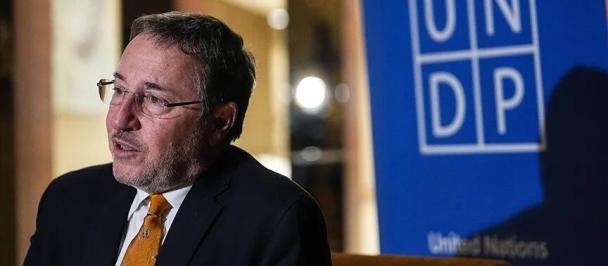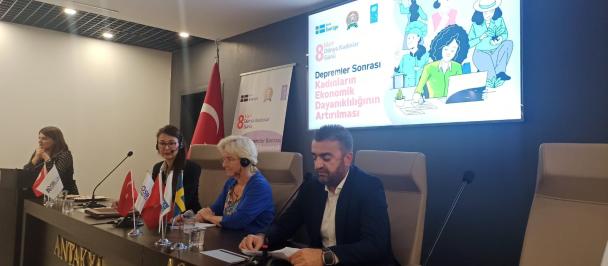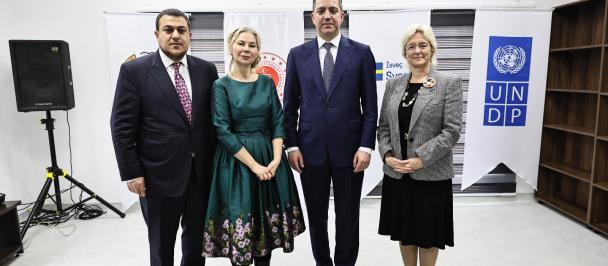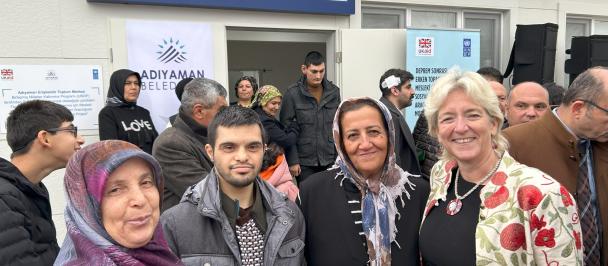United Nations Türkiye visits Hatay to demonstrate commitment to stand in solidarity with Türkiye on the anniversary of the February 6 earthquakes
January 27, 2024

Babatunde Ahonsi, United Nations Resident Coordinator in Türkiye and Miodrag Dragisic, UNDP Türkiye Deputy Resident Representative
“We need the international community to fully provide the funds pledged to support the earthquake response. This is essential to build back better and to leave no one behind” says Babatunde Ahonsi, United Nations Resident Coordinator in Türkiye.
On 26 January, as part of activities on the anniversary of the February 6 earthquakes, a United Nations Türkiye delegation including UN Resident Coordinator, Dr. Babatunde Ahonsi, and representatives of IOM, UNDP, UNFPA, UNHCR and UNICEF visited Hatay.
“We are in Hatay today. It is one of the provinces where the earthquakes took the highest toll. A year has passed, but the agony the earthquakes caused can still be felt. Hatay is one of the provinces that lost the highest number of lives. We also lost five of our UN family members in Hatay” said Ahonsi.
During the visit UN Türkiye delegation visited UN project sites contributing to the earthquake recovery efforts and to get first-hand information on the work done and also to meet the recipients of the services provided.
The delegation also met Hatay Deputy Governor Mr. Doğukan Mızrak. During the meeting, Mr. Ahonsi emphasized the importance they attach to working together with the local administration and municipality to increase the resilience of the people and leave no one behind.
Field visits
The visit started at the International Organization for Migration (IOM)’s warehouse, which was critical for the swift delivery of aid to affected communities. “Fortunately, our warehouse was not significantly damaged. It served as a place for refuge for our team in the immediate aftermath, allowing IOM to be operational from the onset,” explained Lance Bonneau, Head of Sub Office of ESEM Region. “The warehouse ultimately helped us deliver essential items to over 1.4 million people and provided the springboard to provide comprehensive recovery support in the region.”
Delegation also visited UNFPA project site. After the devastating earthquakes in February, UNFPA was on the ground from day one. Thanks to the strong partnership with the Government of Türkiye and the commitment of several donors and partners, UNFPA has been providing lifesaving sexual and reproductive health (SRH) and gender-based violence (GBV) information and services to the most vulnerable earthquake survivors through 11 static and 11 mobile service units currently.
UN Türkiye Resident Coordinator Babatunde Ahonsi along with UNFPA Türkiye Representative Mariam Khan and the representatives of UN agencies visited one of the mobile service units in Hatay, the most affected province by the earthquake where UNFPA works in collaboration with MDM (Doctors of the World/Médecins du Monde - Turkiye), operating one static and two mobile service units to provide Sexual and Reproductive Health (SRH) and Gender Based Violence (GBV) services and counseling, to conduct awareness-raising activities and maternity services and to distribute dignity kits to thousands of women and girls from both host communities and refugees.
Ahonsi and the UN team observed the earthquake response activities, talked to beneficiaries and listened to their needs. They also got information from the service providers on how to improve provided services. UNFPA Türkiye Representative Mariam Khan stated that UNFPA would continue working across the earthquake affected region to advance rights and choices for the most vulnerable, especially women and girls.
Delegation also visited UNHCR-supported community centre run by UNHCR partner, Support to Life (STL), to observe a group psychosocial support session on resilience mechanisms with the participation of earthquake-affected refugees and host community members. The participants had the opportunity to share their personal stories and mechanisms they have used to build resilience and on the positive impact that psychosocial support activities had on them post-earthquakes.
UNHCR Türkiye Representative Angela Li Rosi highlighted the importance of psychosocial support to mitigate the adverse psychological effects of the earthquakes, stating, "Our findings indicate an increased level of anxiety and stress among both refugees and host community members. This is a natural disaster that affected everyone. However, people who had faced displacement before seeking asylum in Türkiye experienced an additional loss in the aftermath of the earthquakes. UNHCR remains committed to supporting national efforts to improve conditions and maintain dignity for all, including refugees.”
The UN delegation visited the Birlike (Together) Hub located in the Haraparası Container Camp to observe UNICEF-supported interventions in response to the earthquake. In the earthquake-affected areas, 47 hubs for children, adolescents and their families have been established in ten provinces. These hubs provide psychosocial support, education catch-up classes, homework assistance, and protection services. These efforts have reached more than 639,000 children and caregivers to date. UNICEF continues its collaboration with the Government of Türkiye as well as NGOs and the private sector to support needs in the earthquake-affected areas on education, child protection, water-sanitation-hygiene and immunization. These joint efforts and collaboration have provided assistance to 5.3 million people, including 2.4 million children.
Filippo Mazzarelli, the Chief of UNICEF Türkiye’s Gaziantep Field Office accompanying the visit, stated, "Since the tragic earthquakes, UNICEF Türkiye has been on the ground to provide immediate humanitarian assistance. In keeping with our mandate to stay and deliver, we continue to support the provision of essential services to children and families and helping rebuild systems including in education, health care and social protection. UNICEF, as part of the UN system and with of the development partners, firmly believes that together we will support all children and their families to recover from the tragedy."
The visit ended at the Accessible Community Center opened by the United Nations Development Programme (UNDP) in Hatay. This prefabricated structure, erected and equipped with funding from the United Kingdom, is providing essential social care services for persons with disabilities and the elderly. The UN officials also met with women entrepreneurs who received UNDP “earthquake recovery grants” to reopen businesses destroyed in the disaster. Hairdresser Gülcan Mengüllüoğlu, beekeeper Güler Balcı and boutique owner Ceylan Arcak shared their stories. In all, UNDP has supported 4,616 small businesses across all 11 earthquake-affected provinces; women account for 42 percent of the recipients. The grants program, worth US$10 million in total, was funded by Sweden.
“For the past 12 months, UNDP has been leading social and economic recovery efforts, focusing on restoring care services for vulnerable groups, assisting municipalities with the management of waste and earthquake debris, helping to restore livelihoods and revive business activity in devastated communities, and protecting the region’s priceless cultural heritage,” said UNDP Türkiye Deputy Resident Representative Miodrag Dragisic. “As we mark one year since the disaster, the needs remain vast, so we urge the international community to sustain the generosity that enables us to revive livelihoods and rebuild communities.”

 Locations
Locations



